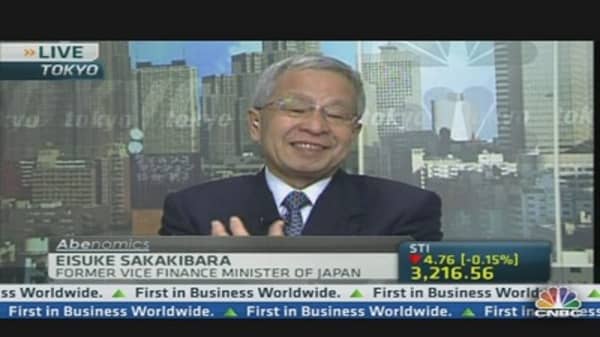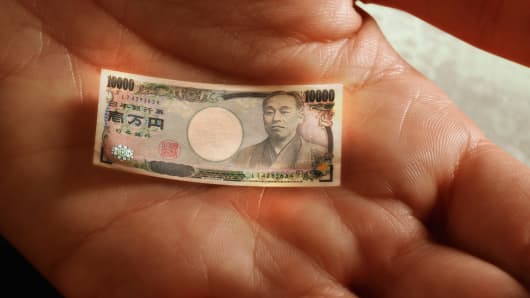Further weakness in the yen, trading near its lowest level in more than two years against the dollar, is unlikely given the currency's recent and rapid decline, said former top currency official in Japan Professor Eisuke Sakakibara, adding that a dollar/yen rate around 90 'sufficient' for Japan's manufacturers to reap the benefits of a weakened currency.
The yen has weakened 13 percent over the past three months to about 89.65 per dollar on expectations of aggressive monetary policy easing by the Bank of Japan (BOJ).
In what is widely seen as a watershed moment, the Bank of Japan on Tuedsay doubled its inflation target to 2 percent and made an open-ended commitment to buy assets from next year, surprising markets that had expected another incremental increase in its $1.1 trillion asset-buying and lending program.
"Some people think it (dollar/yen) will head to 95, 100, I don't think so. The market has already incorporated further monetary easing. So, I don't think further weakening of the yen is likely," Sakakibara told CNBC's "The Call" on Tuesday.
(Read More: Picture This: The dollar at 100 Yen)
Sakakibara, known as "Mr Yen" for his efforts to influence the yen's exchange rate through verbal and official intervention in the currency markets as a former Vice Finance Minister of Japan in the late 1990s, said that further currency weakness was undesirable.
A softer yen has been encouraged by Japan's new government, led by Prime Minister Shinzo Abe, who has pledged to end an era of deflation and revive the economy. The recent move in the currency has also been welcomed by Japan's exporters, which have suffered from strength in the yen which they had blamed for weak exports.
"If the yen weakens too much then that would be a bad thing for Japan's economy too," Sakakibara said. "I think the yen at 90, 91, 92 to the dollar would be a sufficient rate for the Japanese manufacturers to get the benefits."
On the subject of who would be the next governor of the BOJ, Sakakibara said former BOJ deputy governor Toshiro Muto was a strong candidate.
(Read More: Is the 'Abe Trade' in Danger of Unwinding?)
BOJ Governor Masaaki Shirakawa's term expires in April and the appointment of his successor is in the spotlight given the pressure on Japan's central bank to pursue an aggressive monetary policy.
Muto was the government's first choice as BOJ Governor in 2008 but his nomination was rejected by the upper house of parliament who saw Muto as a threat to the central bank's independence since he had spent much of his career at Japan's finance ministry.
"I think the strongest contender at this time (for next BOJ Governor) is Mr. Muto," Sakakibara said. "He was once the deputy governor at the BOJ as well and his nomination to be governor was turned down by the DPJ (Democratic Party of Japan) in the upper house some years ago. But I think that this time the (ruling) LDP (Liberal Democratic Party) would consult with the DPJ not to turn down Mr Muto's nomination."





